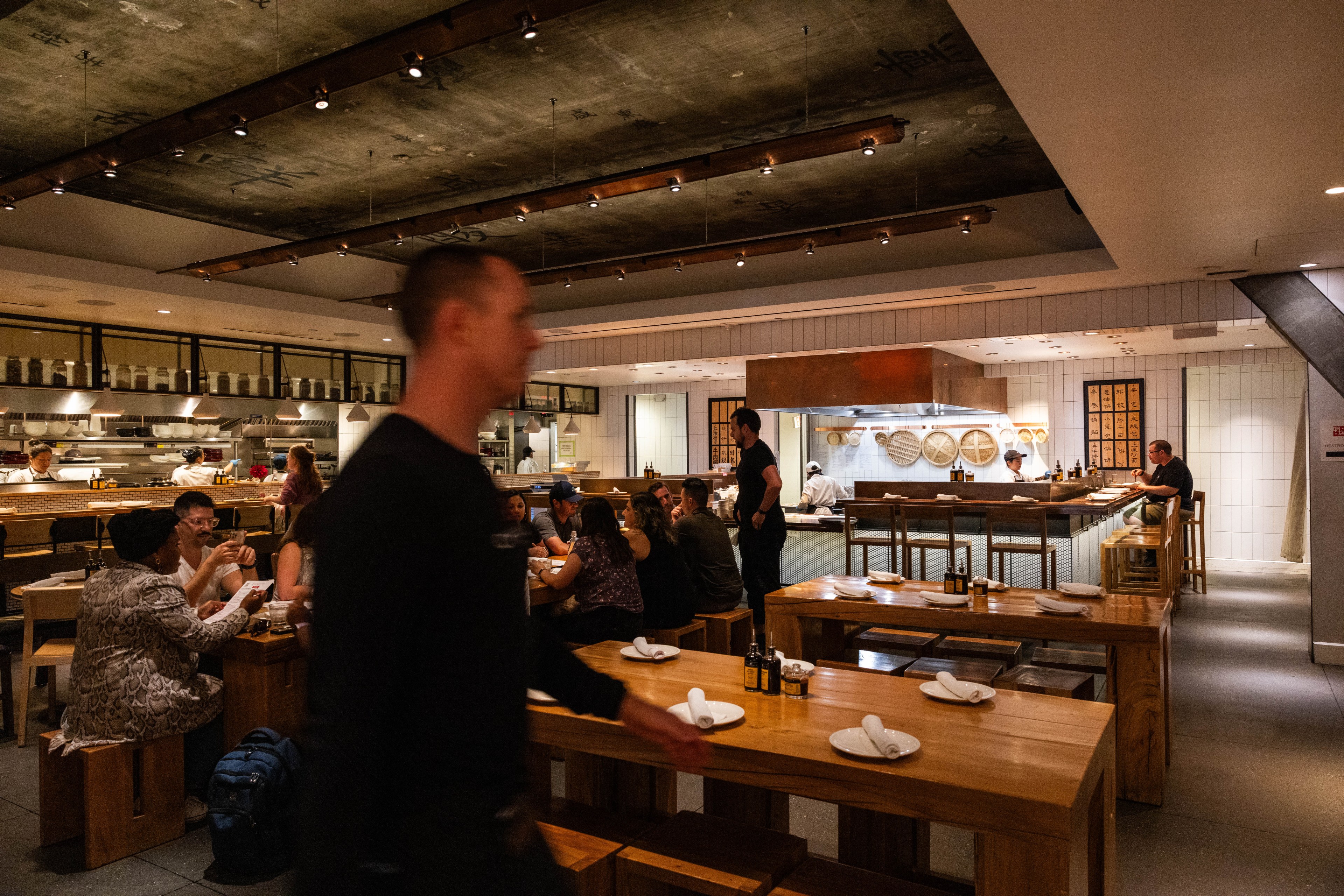George Chen, chef and owner of China Live, levied a 20% service fee on customers upon reopening in 2020 after a temporary pandemic closure to sustain livable wages for his staff amid widespread industry layoffs.
Chen said the extra money has helped maintain salaries across the board at the sprawling Chinatown restaurant, and he’s seen 95% retention among his staff since he instituted it.
But a new state law slated to go into effect on July 1 would effectively outlaw such surcharges, doing away with what has become an increasingly common method of boosting restaurant wages amid rising costs and creating pay equity among front- and back-of-house staffers.
“It’s disturbing news,” Chen said. “They’re trying to change something that’s actually working.”
According to statements from the state Attorney General’s Office, California restaurants will no longer be allowed to add surcharges to customers’ bills, even if they are clearly marked on menus.
That means nixing the near-ubiquitous 5% SF Health Care Security Ordinance surcharge, which is tacked onto bills to help cover the cost of city-mandated health coverage for employees, as well as service fees that have replaced tips at many local restaurants.
Chen said he’s only had a handful of Yelp reviews that have complained about the service charges, generally when customers accidentally tip on top of the service fee. Each time, he has offered a refund.
California’s passage of SB 478 last year was meant to eliminate so-called junk fees, which include charges tacked onto credit cards, bills, loans, air travel, hotel rooms and event tickets. Sponsored by Attorney General Rob Bonta and state Sens. Bill Dodd and Nancy Skinner, the law was meant to protect consumers.
Laurie Thomas, executive director of the Golden Gate Restaurant Association, said since news of the new law spread, she’s been fielding nearly nonstop calls from frustrated and frightened restaurateurs.
Thomas, who owns two Cow Hollow restaurants, Terzo and Rose’s Cafe, said these surcharges were instituted by businesses to help defray the exploding costs of operating in San Francisco.
“Restaurateurs aren’t doing this to buy a yacht and go to the Caribbean. They've been doing this to make ends meet,” Thomas said, citing the rising minimum wage and food prices as pressure points for small businesses.
Another point of concern, Thomas said, is that SB 478 includes “real legal teeth” for scofflaws, putting restaurants at severe risk of being sued by customers. Thomas said she’s hoping a legislative fix could still be enacted or at least a delay in implementation or enforcement to help ease the shock for businesses.
“Everyone has had a tough year,” Thomas said. “Sales are down, costs are high and we’re seeing the impacts of the tech layoffs and the high interest rates.”
Sticker shock
Yuka Ioroi, the co-owner of Cassava in North Beach, instituted a service surcharge during the pandemic for a few key reasons, chief among them trying to create a more equitable pay structure and to streamline operations.
“Whether you are dish washer or a server, for us, they get paid the same,” Iorioi said. “That system works for us.”
She said all the proceeds from her service surcharges go directly to staff while also making the bill payment process more efficient.
Without the ability to add surcharges on the back end, restaurants will be forced to pass on these costs via higher menu prices. Many business owners are concerned that the sticker shock will frighten away customers.
“You’re lumping into the service charges with junk fees, which they’re not,” Chen said. “It’s absurd that the state would legislate and mandate a law that doesn’t make sense for any party.”
Ioroi used the example of a three-item prix fixe option for $52 on Cassava’s menu. Adding the service charge on the front end would raise that menu price to $65 plus taxes, a not-insignificant increase.
Although the customer pays the same price in the end, restaurant owners are sensitive to how pricing changes affect the psychological calculation for customers.
Although Ioroi isn’t sure how much the new pricing model would impact her regulars, who are already numb to San Francisco’s sky-high prices, she could see it hurting sales among tourists and other less frequent diners.
Waiting for a plate of oysters at Mission District's Fort Point Valencia, SoMa resident Dominique Dismuke said that higher restaurant menu prices might indeed deter her from dining out, as she often orders based on the price of menu items without accounting for surcharges.
“With all the hidden fees, I’m like, ‘I didn’t realize I’m paying this much,’” Dismuke said. “There’s all this other stuff they charge you, but you’ve already eaten.”
Miranda Holeton, a customer at Etcetera Wine Bar on Valencia Street, said she prefers the way things are, seeing surcharges separately on the bill rather than baked into the price.
“I’d rather see the percentage on the bill because you know where the money’s going,” Holeton said.
Some customers appreciate the predictability promised by the new law, and restaurant owners begrudgingly admit that things will likely eventually stabilize. But the transition might be a death knell for those already struggling to make it in a notoriously unforgiving industry.
“People will either have to raise prices, go back to the old tip model or do a combination of both,” Thomas said. “If we’re all like frogs, we’ll all slowly adjust to it. Well, until we boil to death.”
